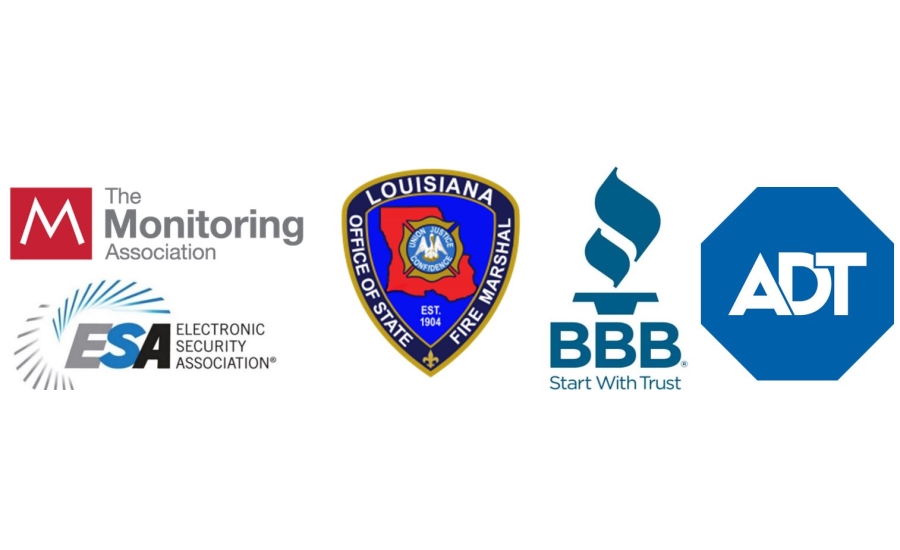
ADT Annual Deceptive Sales Practices Conference Educates and Raises Awareness
It’s that time of year again when the door-to-door salespeople are out in force trying to spread the word about security services in their area, and once again ADT is spreading the word about fighting fraud and deceptive sales practices, teaming up this time with the Louisiana State Fire Marshal, the Better Business Bureau, TMA and ESA.
On May 18, The Louisiana State Fire Marshal, local victims and leaders of BBB and national industry associations spoke about this issue and offered consumer protection tips during a news conference held at the office of the Louisiana State Marshal, H. Butch Browning in Baton Rouge.
“What we’re trying to do is let people know what legitimate door-to-door sales are,” Browning said. “The ones that are fraudulent, that are illegitimate, we want to stop.”
Also addressing the gathering that was live streamed by the Better Business Bureau and is available at www.bbb.org/livestream were two Louisianans who fell victim to deceptive sales practices and shared their stories.
This marks the fifth year ADT has been involved in an event designed to bring awareness of a problem that has plagued the industry for decades. The first two years ADT had the event in conjunction with ESX, but after determining that ESX was a little too late in the season, ADT decided the event should take place earlier in the selling season to ensure it was top-of-mind at a time it will do the most good.
“We chose Louisiana this year,” said Bob Tucker, public relations director, ADT, “because Chief Browning has a major role here in permitting with the alarm companies and has been very active in this issue in the past.”
In 2017, consumer complaints about home security sales ranked in the top 25 of the 3,500 business categories BBB tracks. “I recall when we first started doing this five years ago,” said Merlin Guilbeau, executive director/CEO, ESA, “we were in the top 10. I think it’s been an educational process and certainly a collective effort amongst the industry, the Better Business Bureau and regulators. Here in Louisiana the industry has a special relationship with fire marshal and the folks that regulate them; it is really a working effort where they collaborate together. It’s a model other states really should consider.”
Carmen Million, president, BBB serving Southwest Louisiana, said, “BBB’s mission is substandard marketplace behavior and to educate consumers about fraud, scams and unsavory business practices.” Million explained that in 2017 more than 700,000 consumers across North America turned to the BBB to look up information about home security companies. “But they also came to us to complain.” Million said the high number of complaints about security companies indicates consumers are not asking enough questions before making this significant purchase for their homes — “but it also tells us there are some bad apples in the industry,” she said.
Million said nearly 195 home security companies nationwide have a C-rating or below with the Better Business Bureau. “The good news is,” she said, “that’s only a fraction of the approximately 12,000 security companies in the U.S., and shows that a large majority of security companies manage ethical, trustworthy businesses.”
Jay Hauhn, executive director/CEO of The Monitoring Association, also spoke. “In the life safety industry, credibility is very important,” Hauhn said. “So when that sacred trust that customers place in us is violated, even by a small band of bad actors, we all suffer. So ridding the industry of those who practice such tactics is very important to me, and to my association’s members. We are making progress and our message is getting out.”
Part of the solution, Million said, is to get legitimate companies and consumers to report abuse so that the BBB can resolve the issues and bring awareness to the deceptive practices. “We do see that it is getting better, especially in our area, because of this collective effort. But I think we need to continue this education, not just to consumers, but to businesses, to let them know their rights and responsibilities and what they are required to do.”
Guilbeau agreed, explaining that the security dealer plays a major role in bringing awareness to and ultimately stopping deceptive sales practices in the industry. “I’m beginning to see the e-newsletters security companies are sharing with their customers, and it’s interesting that this time of year they’re starting to warn their customer base that it is the season for selling, and what to expect from their company. They’re doing things to try to help educate their own customer base. That is very effective and it tells the customer that my security company is looking out for me.”
Browning added that the success he is seeing in Louisiana depends on the relationship his office has with the industry, both the individual companies and the state associations that represent them. “One of the successes we had recently is developing a series of public service announcements we produced to educate the public on licensure, what deceptive door-to-door campaigns are, and just consumer protection in general. We also explain how they can report those deceptive practices.”
These public service announcements were paid for by the individual security companies and the organizations in the state; Browning called those public/private partnerships a “win-win.”
